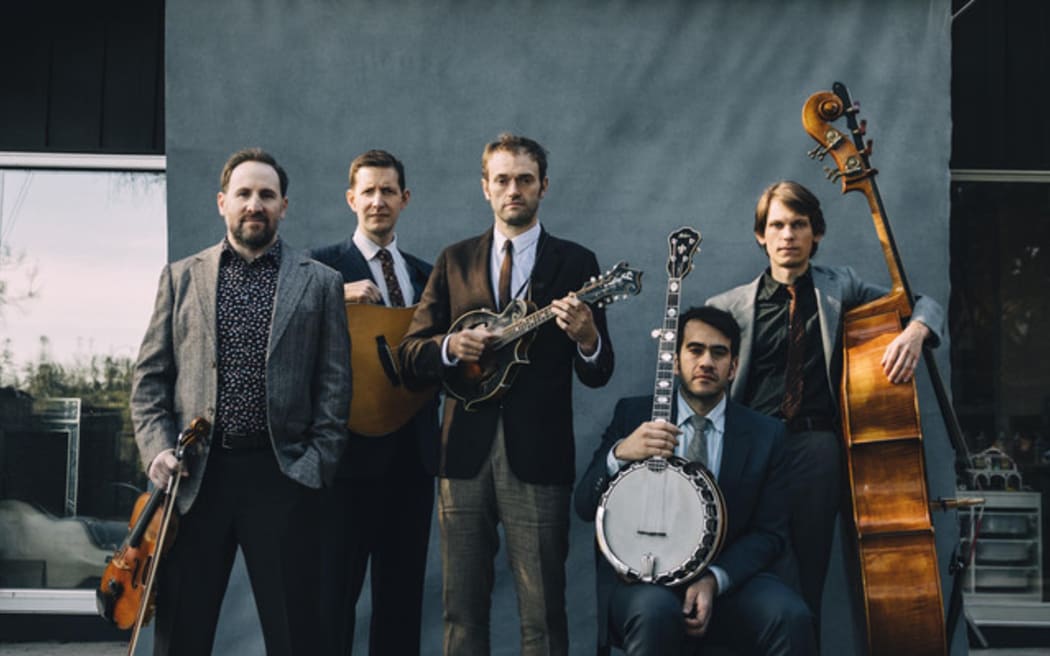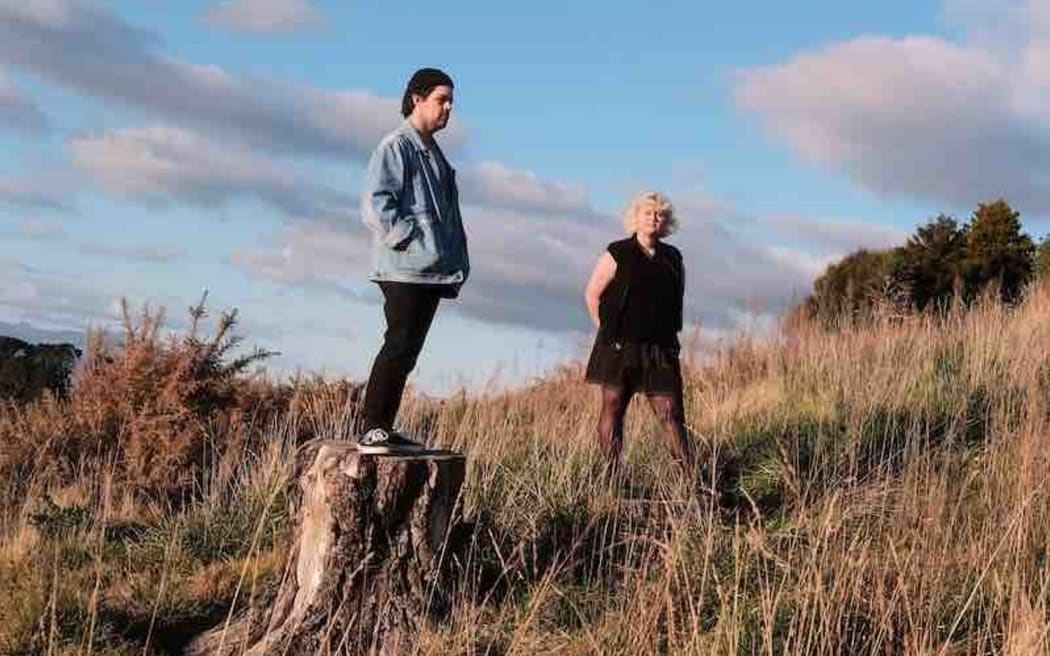Elliott Childs reviews a collaboration between Vieux Farka Touré and Khruangbin, the latest album from Punch Brothers and a new EP from local band Sports Dreams.
Ali by Vieux Farka Touré & Khruangbin

Photo: Provided
Vieux Farka Touré was never supposed to be a musician. His father, revered Malian musician and pioneer of the African Blues sound Ali Farka Touré, forbade him from following in his footsteps and Vieux’s defiance of his father’s wishes caused a rift between the two of them for some time.
Thankfully they eventually reconciled and even managed to record a handful of tracks together before Ali’s death from cancer in 2006.
Now, 16 years later, Vieux Farka Touré has named his latest album Ali as a tribute to his father. It features eight of his compositions, chosen by the late musician’s 11 children and all recorded in a barn with Texan band Khruangbin.
Khruangbin are known for their rather wide-ranging influences. Elements of psychedelic rock, Thai music, Dub and funk all have a place in their sound. And it is that distillation of music from across the world that makes them such a wise choice to help reinterpret the music of a musician who was a huge part of making the world aware of the guitar music of west Africa.
Khruangbin essentially act as a backing band here but one that makes all the difference. Whilst Ali Farka Touré’s recordings were often sparse, featuring his guitar, voice and some traditional African percussion, these reimagined versions are sonically lush in comparison.
Songs like ‘Tongo Barra’ use Khruangbin’s instrumentation to enhance the already funky nature of the music. Mark Speers’ rhythm guitar works in tandem with Farka Touré’s whilst Laura Lee Ochoa’s bass and Donal Johnson Jr’s percussion form a wonderfully cohesive rhythm section, perfectly accenting the beat behind the twisting guitar lines.
According to an interview the band gave with the BBC, they were not told what songs they would be playing and were only taught the music by Farka Touré on the day of recording so there was no chance for them to generate any preconceived ideas of what to play. This along with the language barrier presented by the lyrics being sung in a variety of west African dialects, meant that the band were unburdened by the history of the music and free to add their own touches to it, including the Cajun accordion and washboard sounds on ‘Mahine Me’.
Whilst Khurangbin were unencumbered by the history of these songs, Farka Touré’s experience was likely completely different. This is after all his history.
Familial comparisons are something Vieux Farka Touré has always had to contend with and he’s worked hard in his career to forge his own path. But on Ali, a record that is as much about Ali Farka Toure’s music as it is his, his guitar playing is spookily close to his late father’s.
He plays in the instantly recognisable west African fingerstyle that his father did. A cornerstone of what’s often referred to as the desert blues. And they both have the same treble-heavy guitar tone drenched in a chorus effect. Their phrasing is the same too and whilst it is clear he has studied his father’s playing meticulously, in that same BBC interview he said of his father “When I'm at the studio with a guitar in hand, his words go through my whole body, so it comes on its own. It is a feeling that can't really be explained."
Hell On Church Street by Punch Brothers

Photo: Provided
When legendary Bluegrass guitarist Tony Rice died while making his coffee on Christmas morning of 2020, mandolin player Chris Thile tweeted: “No one has had a more profound impact on my musical world. His playing, singing, writing, and arranging broke the bluegrass mould and will eternally attest to the fact that music can take you anywhere, from anywhere.”
What wasn’t mentioned until later on in the year was that Thile’s band Punch Brothers had, just one month earlier, recorded a brand new version of Tony Rice’s much loved 1983 album, Church Street Blues.
Rice’s original album was done solo with most tracks containing nothing more than his voice and guitar. The songs were a collection of traditional tunes, such as Cattle In The Cane and some more modern songs by writers like Bob Dylan and Tom Paxton.
Though they may seem like hokey choices to a modern audience Rice’s inclusion of Ralph McTell’s ‘Streets of London’ and ‘The Wreck of the Edmund Fitzgerald’ by Gordon Lightfoot make sense when you remember his version was record in 1983. Nearly 40 years later, both songs have been covered to death but the punch brothers make a valiant effort to try and breathe new life into them.
One thing that becomes immediately clear from listening to any Punch Brothers record is how skilled they are as musicians. Which is fortunate because only musicians with such a skill level could attempt to take on Rice’s original album without simplifying it dramatically.
Punch Brothers also manage to avoid making things overly complicated, yet they bring a very different, almost avant-garde approach to the arrangements.
Take ‘The Goldrush’ as an example. Written by the father of Bluegrass, Bill Monroe, the original is an upbeat piece in the vain of the traditional bluegrass sound, as is Rice’s stripped-down version. Punch brothers have taken the melody and slowed it dramatically making it almost mournful. The result is haunting and beautiful and could easily be a piece from the soundtrack to a beautifully shot movie set in the hills of Appalachia.
Tony Rice’s original version of Church Street Blues is arguably the finest album of his career. The result of his unique guitar style and rich voice being leant to a very well-chosen repertoire of songs.
It is hard to re-imagine an album like that and do it justice, let alone add to it and honour your own creativity in the process. Yet, Punch Brothers have managed just that. Rice died before they could present him with the recording as they had planned but it is hard to imagine he would be anything short of thrilled with it.
Weather Admitting EP by Sports Dreams

Photo: Provided
It is apparently spring. And while in many parts of Aotearoa, that just means slightly less cold rain, after what has, for many of us felt like an insufferably long winter, the tantalising promise of summer is on the horizon.
And It is this hopeful, yet cautious state of emerging slowly from the darkness of the winter months that underlines ‘Fuzzy’, the first track of the new Weather Admitting EP from Palmerston North’s Sports Dreams.
In fact, as the title suggests, all 5 of the songs on the EP are influenced by the weather. On their band camp page, Sports Dreams say “These songs are about the weather; the shifts that occur between the seasons and the things they have to tell you in between.”
Whilst ‘Banger’ is not the club-shaking anthem that it is name implies, there is something undeniably uplifting about the bright, shimmering guitars and swirling synths. Though for all its woozy brightness, its lyrics betray it is intent as a breakup song, putting it in that most hallowed category of pop music, happy-sounding songs that are actually sad songs.
There is a haziness to Weather Admitting that is reminiscent of 90’s bands like Cocteau Twins and Red House Painters though with Fraser Williams’ drum machine and synth parts there is an added element of 80’s electro-pop too.
Recorded and mixed by Poneke-based engineer and artist Jesse Austin-Stewart at the studios of Massey University, Weather Admitting is a step forward for Sports Dreams in terms of production.
There is a depth of sound here that was missing from their 2019 self-titled debut. The multi-tracking of Shannen Georgia Petersen’s voice alone adds new dimensions to even the more sparsely arranged songs.
Whilst Sports Dreams say weather is the focus here, to me Weather Admitting is a collection of songs primarily about change. Whether it is the changing seasons and the hope that brings, someone dealing with new circumstances or perhaps longing for a change in themselves or someone else.
The pretty, reverb-drenched final track, ‘Matairangi’ finds Petersen wishing that an unnamed person would make their move whilst she “walks up big hills in the rain”. Though hopefully summer is just round the corner.

